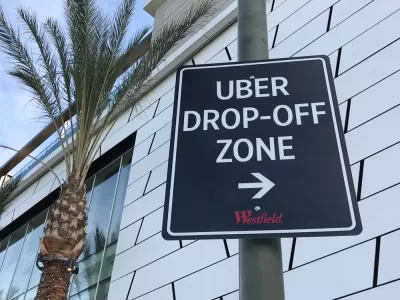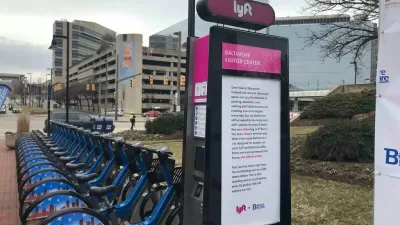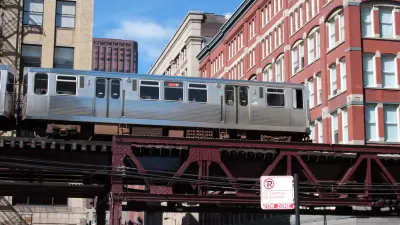The cost of 'deadheading'–the time ride-hailing drivers spend looking for fares–offsets any environmental benefits created by the industry, despite early claims that the apps would reduce congestion and air pollution.

Despite early promises to reduce personal car trips and ease urban congestion, data shows that ridesharing companies like Uber and Lyft have done the opposite. "Now a new study puts a price on the external costs that come with switching from a personal vehicle to one from a transportation network company (or TNC): about 35 cents per trip on average. And it finds that even a fully electrified fleet of ride-hailing cars may not fully mitigate the extra toll they exact on society compared to driving yourself," writes Laura Bliss.
The authors of the study "simulated replacing 100,000 private passenger vehicle trips with TNC trips in six U.S. cities, using publicly available ride-hailing data from New York City, Austin, Chicago and the state of California." The simulation showed that, while TNCs "brought a 50% to 60% decrease in local air pollution costs" by keeping cars in use more of the time and hence reducing the pollution caused when fuel-combustion engines start cold, "that benefit was undone by the negative impacts of deadheading, or the time in between trips when drivers are traveling passenger-free to their next pickup." According to a 2019 report from the ridesharing companies themselves, "deadheading accounted for roughly 40% of all TNC miles across six U.S. cities." This added traffic "increased fuel consumption and its associated greenhouse gas emissions by roughly 20%, and drove up social costs linked to congestion, crashes and noise by 60%."
When analyzed against public transportation, "[t]he costs to society tripled," Bliss writes. "More surprising is that when Michalek and his collaborators simulated a fleet of 100% zero-emission TNC vehicles — charged by a zero-carbon grid — the external costs of ride-hailing only dropped by 16% to 17%." This means that "even a fully electrified ride-hailing industry — the likes of which Uber and Lyft have both promised by 2030 — would not be enough to make up for the congestion and deaths created by the added TNC miles." This is only mitigated when rides are pooled, though pooled rides are still more harmful than taking public transit.
One way cities can discourage single TNC rides is by pricing them accordingly, encouraging riders to pool rides while maintaining the positive effects of ridesharing apps, such as "providing late-night transportation services and reducing drunk driving."
FULL STORY: That Uber or Lyft Trip May Be Worse for the Planet Than Driving Yourself

Planetizen Federal Action Tracker
A weekly monitor of how Trump’s orders and actions are impacting planners and planning in America.

Chicago’s Ghost Rails
Just beneath the surface of the modern city lie the remnants of its expansive early 20th-century streetcar system.

San Antonio and Austin are Fusing Into one Massive Megaregion
The region spanning the two central Texas cities is growing fast, posing challenges for local infrastructure and water supplies.

Since Zion's Shuttles Went Electric “The Smog is Gone”
Visitors to Zion National Park can enjoy the canyon via the nation’s first fully electric park shuttle system.

Trump Distributing DOT Safety Funds at 1/10 Rate of Biden
Funds for Safe Streets and other transportation safety and equity programs are being held up by administrative reviews and conflicts with the Trump administration’s priorities.

German Cities Subsidize Taxis for Women Amid Wave of Violence
Free or low-cost taxi rides can help women navigate cities more safely, but critics say the programs don't address the root causes of violence against women.
Urban Design for Planners 1: Software Tools
This six-course series explores essential urban design concepts using open source software and equips planners with the tools they need to participate fully in the urban design process.
Planning for Universal Design
Learn the tools for implementing Universal Design in planning regulations.
planning NEXT
Appalachian Highlands Housing Partners
Mpact (founded as Rail~Volution)
City of Camden Redevelopment Agency
City of Astoria
City of Portland
City of Laramie




























